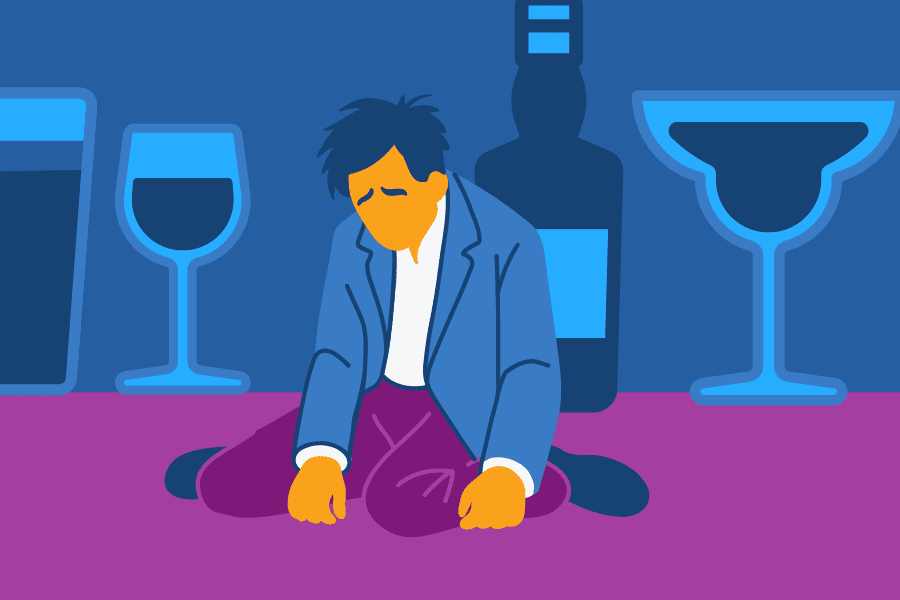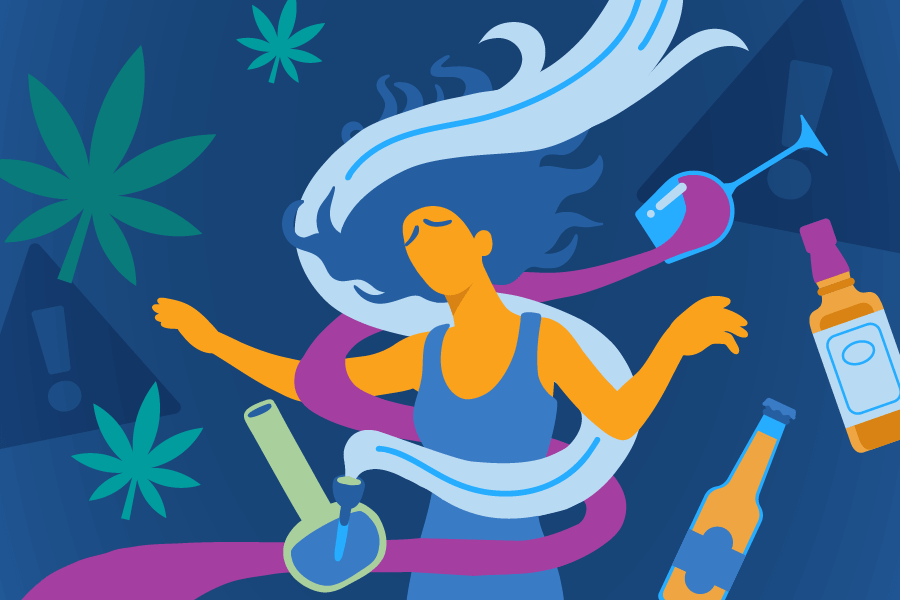What Is The Difference Between Alcohol Addiction and Alcoholism?
Alcohol addiction and alcoholism are terms used to describe a medical disorder called “alcohol use disorder.”
According to the National Institute on Alcohol Abuse and Alcoholism (NIAAA), “Alcohol use disorder (AUD) is a medical condition characterized by an impaired ability to stop or control alcohol use despite adverse social, occupational, or health consequences.”
A national survey on AUD prevalence in 2019 found that:
- 14.1 million adults ages 18 and older (or 5.6% of this age group), and
- An estimated 414,000 adolescents ages 12–17 (or 1.7% of this age group)
AUD is considered a brain disorder that causes you to drink alcohol compulsively. You might have a mild, moderate, or severe form of AUD. Other terms used to describe different severities of AUD include alcohol abuse and alcohol dependence.
AUD can have adverse effects on your physical and mental health. You might also struggle with social issues, like legal problems and relationships. While there is no cure for AUD, this disorder can be treated to prevent relapse and begin recovery.
Comprehensive Levels of Care
No matter where you are in your recovery journey, our levels of care are personalized to your unique needs.
Is Alcohol Use Disorder a Type Of Substance Use Disorder?
According to the latest edition of the Diagnostic and Statistical Manual of Mental Disorders (DSM-V), alcohol is one of the substances considered when diagnosing a substance use disorder.
The American Psychiatric Association (APA) defines all mental health disorders in the DSM. Substance use disorders are used in psychiatry to describe addiction and dependence on any substance, including alcohol, prescriptions, and illegal drugs.
Alcohol use disorder (AUD) can be considered a type of substance use disorder (SUD). Even if you don’t use other drugs, SUD defines a range of behaviors related to addiction and substance abuse.
Adolescents and young adults who abuse alcohol are more likely to use other substances.
Alcohol abuse can change how your brain works. Alcohol and other drugs are a shortcut to your brain’s natural reward system. When young people use alcohol, they could be hijacking this system to feel good or cope with stressors.
While you might only use alcohol, addiction to any substance looks similar to others. Although each drug affects your brain differently, SUD means you continue to drink or use drugs despite negative consequences.
Most addictions begin gradually with everyday drinking habits until you start using excessively. Excessive drinking can lead to alcohol addiction.
What Defines Excessive Drinking and Alcohol Abuse?
Excessive drinking and alcohol abuse can be defined by two unhealthy drinking habits: binge drinking and heavy drinking.
Both binge drinking and heavy drinking habits can lead to AUD. Not everyone who drinks will develop an addiction. However, these behaviors can put you at a higher risk of alcohol addiction.
According to the Centers for Disease Control and Prevention (CDC), “Binge drinking is most common among younger adults aged 18–34 years.”
Young adults, especially those in college, are at a higher risk of binge drinking. The NIAAA states that “about 33 percent [of full-time college students ages 18 to 22] engaged in binge drinking” during the month surveyed.
Binge drinking is defined by the CDC as:
- Drinking pattern that brings your blood-alcohol concentration (BAC) to 0.08 or higher
- For men, consuming five or more drinks within two hours will bring theBAC to this level
- For women, about four or more drinks within two hours will have the same result
Teens and young adults below the age of 21 might binge drink due to a lack of access to alcohol. When they get alcohol, they might overdrink because they can’t get alcohol as easily as adults.
Heavy drinking can include binge drinking but usually means that you drink more regularly than most binge drinkers. Binge drinkers might be “weekend warriors” or occasional drinkers. Heavy drinkers typically drink various amounts of alcohol throughout the entire week.
The CDC defines heavy drinking as:
- Men who drink 15 or more alcoholic beverages per week
- Women who consume eight or more alcoholic drinks per week
These excessive drinking habits can lead to high tolerance, dependence, and addiction. You might be concerned that your loved one has a drinking problem, even if this behavior appears “normal” for their peer group.
What Are the Signs That My Loved One Has a Drinking Problem?
You can look for the following signs that could mean your loved one has a drinking problem:
- Do they seem “off” or not like themselves?
- Are they irritable or agitated easily?
- Do they have poor sleeping habits, like staying up late and sleeping in?
- Do they have a preoccupation with drinking?
- Are they having problems with friends and family members?
- Do they have intense or sudden mood swings?
- Have they tried to quit or cut back without success?
- Are they getting into trouble and struggling at work or school?
- Are they experiencing alcohol withdrawal symptoms when they don’t drink?
- These symptoms include:
- Insomnia
- Vomiting and nausea
- Excessive sweating
- Clammy skin
- Tremors or shakiness
- Anxiety or depression
- These symptoms include:
- Do they spend most of their free time drinking or in social activities that revolve around drinking?
- Despite adverse social, mental, or physical health problems, do they continue to drink?
- Are they reluctant to tell you where they have been and who they are spending time with?
- Have you noticed alcohol on them or smelled it on their breath?
Signs like these could mean that your loved one has a drinking problem. These signs could also indicate other health issues, like mental health disorders. If you are concerned about your loved one, speak with a healthcare professional about the next steps.
What Are the Negative Physical Health Effects of Alcohol?
The NIAAA lists many negative physical health effects of alcohol and excessive drinking, like:
- Decreased brain functions and damage to neural pathways
- Higher risk of developing heart diseases
- Increased risk of stroke
- High blood pressure
- Liver diseases like cirrhosis, fibrosis, fatty liver, and alcoholic hepatitis
- Problems with the pancreas, which could lead to diabetes
- The National Cancer Institute warns that drinking alcohol can cause several types of cancers
- Excessive drinking can weaken your immune system
Some of these health problems develop over time. However, even single episodes of excessive drinking can cause health problems. For example, your immunity can weaken for 24 hours after a night of heavy drinking.
Excessive drinking can also lead to injuries or fatalities from reckless behaviors. The National Highway Traffic Safety Administration (NHTSA) states that 10,142 people died from drunk driving crashes in the US in 2019.
Alcohol addiction increases the risk of these health problems; however, not everyone will become addicted. You or your loved one might have certain risk factors that increase your chance of developing AUD.
Why Do Some People Have a Higher Risk of Alcohol Addiction Than Others?
Certain factors might put you at a higher risk of developing an alcohol addiction than others.
Not everyone who drinks develops an alcohol or substance use disorder. You might be predisposed to addiction because of certain risk factors.
Risk factors for alcohol addiction in teens and young adults include:
- Family history of drug and alcohol problems
- Close family members with a mental health or substance use disorder
- Childhood sexual or physical abuse
- Member of the LGBTQA+ community
- Traumatic experiences
- Low self-esteem
- Poor relationships with parents
- Health problems that cause chronic pain
- Underlying mental health disorders, like:
- Autism spectrum disorder (ASD)
- Attention-deficit/hyperactivity disorder (ADHD)
- Depression and other mood disorders
- Post-traumatic stress disorder (PTSD)
- Borderline personality disorder (BPD)
- Anxiety disorders
- Being in recovery from other substance abuse issues
Some in recovery from hard drugs, like cocaine or heroin, might think drinking is safe for them. However, addiction can damage the brain and set you up for addictions to alcohol and other drugs.
Often adolescents and young adults with an underlying issue might use drinking to cope. Mental health and self-esteem issues can cause social problems for kids. They might feel alienated and use drinking to “fit in” or cope with emotional issues.
Find the Right Facility for Your Needs
Explore our treatment center locations and find an option that works for you.
Why Do Young People Drink Alcohol to Cope?
Young people drink alcohol as a short-term coping mechanism for underlying issues.
Teens and young adults go through many changes as they grow up. They need to make crucial decisions about school, work, relationships, and friendships. Some kids do not have healthy coping skills to manage these challenges.
Alcohol can be a shortcut to feeling good. Young people often don’t consider the long-term consequences of drinking problems. They might feel like they can quit when they want to or that drinking isn’t a problem. Parents might believe their child will “grow out of it.”
Drinking can become a coping mechanism in the absence of other coping skills.
You might use drinking as a crutch when you don’t have other skills to deal with stress. Young people can be more prone to stress due to hormone changes that cause more intense emotions. They also are having some of their first experiences with stress.
When teens and young adults don’t have any healthy way to cope, they could turn to drugs and alcohol. Developing healthy coping skills can shield your child from developing a drug or alcohol addiction.
Healthy coping skills include things like:
- Exercise, even just a walk around the block
- Yoga and meditation
- Cooking and eating healthy meals
- Talking to a loved one or friend when stressed or lonely
- Reaching out to a therapist for a mental health issue
- Reading, listening to music, or watching your favorite shows
- Deep breathing
- Focusing on hobbies, like music, puzzles, drawing, or other projects
Remember that the brains of young people do not fully develop until about age 25. Young people might struggle to handle even a little alcohol or other substances due to a lack of impulse control.
Healthy coping skills can help your loved one avoid drinking as a way to cope. However, you can’t be around your child all the time. Sometimes, young people cave into peer pressure even when they have healthy coping mechanisms.
How Can I Help My Loved One Stop Drinking?
You can help your loved one stop drinking by learning why they drink in the first place.
Young people could be drinking for several reasons. Often, drinking alcohol is a way of fulfilling an unmet need in their lives. Alcohol and substance abuse can be a quick way for teens and young adults to feel good about themselves or fit in with others.
Common reasons why young people might drink alcohol:
- Stress relief
- Avoid painful memories and emotions
- Ease social anxiety to feel relaxed around others
- Take the edge off when feeling nervous, anxious, or in a panic
- Drinking to fit in with others or due to peer pressure
- Misusing alcohol to fall asleep
- Relieve boredom
- Cope with life events, like a fight with a friend, breakup, or loss of a loved one
To help your loved one stop drinking, it is essential to understand what need they are fulfilling. Otherwise, they might not find a healthy replacement to get what they need. They could relapse or turn to other unhealthy behaviors, like unsafe sex or social media addiction.
Talk to your loved one from a place of concern and be non-judgmental.
You want to be straightforward and honest about your concerns about your loved one’s drinking problem. They might get defensive or put off at first. If they have been using alcohol to cope, they might dread a resurgence of their issues without having drinking as a crutch.
Your loved one didn’t start drinking thinking that they would develop an alcohol addiction. They might have been trying to fit in or regulate their emotions with a quick fix. By speaking to them without judgment, you can ask questions to understand their behaviors.
You need to understand why they drink and how much to know how to help them stop.
Health professionals can guide you and your loved one when you are ready to seek addiction treatment. There are many ways to treat alcohol addiction. Many treatment facilities provide comprehensive treatment to address the biological, social, and psychological causes of AUD.
How Is Alcohol Addiction Treated?
Alcohol addiction can be treated in many ways with support from various treatment providers and health professionals.
Substance use and mental health treatment centers can help you during most stages of treatment and recovery. Often, these treatment providers introduce you to new coping skills, help understand triggers, and support you after you leave the facility.
Your first step in treatment might be inpatient detoxification or “detox.“
During detox, you get medical and mental health support as the harmful toxins of alcohol and other substances leave your body. When you stop drinking, you might continue to have cravings due to alcohol dependence. Inpatient detox can help you manage withdrawal. Sandstone Care has 2 inpatient detox centers that you could use in Colorado and Virginia.
Alcohol withdrawal symptoms can be uncomfortable, distressing, and even life-threatening. If you try to quit drinking “cold-turkey” at home, you won’t have the support and medical guidance available to detox safely.
Medication-assisted treatment (MAT) can help you during detox and the early stages of treatment.
MAT uses medications and traditional therapies to help you stay sober when you begin treatment. If you have severe symptoms of alcohol withdrawal that prevent you from engaging in treatment, medications can help you feel normal and less edgy.
For alcohol withdrawal symptoms, you might use medications like naltrexone or disulfiram. These medications can help prevent you from relapsing in early sobriety when you are most vulnerable to cravings.
Inpatient and outpatient treatment programs can help you continue treatment after detox.
After detox, you might be sober, but your treatment has only begun. Detox helps to clear your head from the harmful effects of alcohol. Now, you need to learn new coping skills and understand why you became addicted to alcohol to prevent relapse.
Residential treatment programs are an inpatient form of treatment with intensive support and supervision.
Residential treatment can help you stay sober by living in the facility during your treatment. You will stay with like-minded peers, also working to recover from addiction and mental health issues. You can stay safe from accessing alcohol by staying in a treatment facility.
Outpatient treatment options allow you to live at home while continuing your treatment.
If you can stay safe and sober in your home environment, outpatient programs can help you continue building skills to live a healthy, sober life. Outpatient treatment programs can vary in levels of intensity and support.
Partial hospitalization programs (PHP) require participation for several hours a day, usually four to five days per week for about four to six weeks. If you still have significant struggles after inpatient rehab, PHP might be a step-down treatment option for you.
Intensive outpatient programs (IOP) are similar to PHP with fewer time commitments. You still get intensive treatment, but you have more flexibility to fulfill school, work, or family duties.
Virtual IOP can be a great option if you can’t make in-person treatment due to transportation, disability, or other concerns. You can log in from the comfort of your own home to meet with your therapist and support team.
Support groups are a crucial aspect of ongoing addiction recovery.
Peer support can help you in many different ways. You can build connections with others, learn new skills, express your emotions, and share your struggles. You can find a support group online or in person to suit your needs.
Alcoholics Anonymous (AA) is one of the most common support groups. AA uses a 12-Step approach to alcohol addiction recovery. You meet with your peers to work on each step and share your experiences.
SMART Recovery can help those who want support that is not 12-Step based. SMART Recovery focuses on a 4-point program to help you cope with addiction and other issues.
Treatment programs will engage you in addressing the biological, social, and psychological causes of alcohol addiction. After you leave treatment, you can continue with outpatient services and support groups to achieve your goals without alcohol getting in the way.












